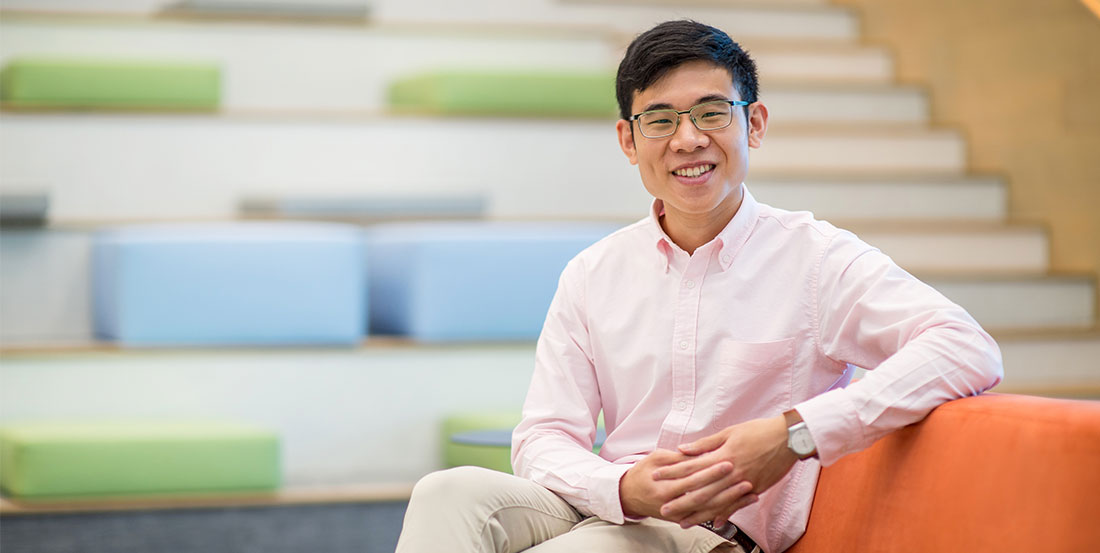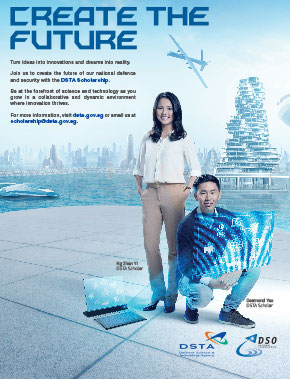The 21st century has brought with it new threats, adding layers of challenge to the defence and security of our nation. While the Singapore Armed Forces (SAF) forms the foundation of our defence, it is also up to our community of defence engineers and scientists to develop the cutting-edge technological solutions the SAF needs. DSTA scholars Low Bowen, John Lee and Jerry Thia share about their work at the forefront of defence technology and the opportunities that the DSTA Scholarship has given them.
What motivated you to take up the DSTA Scholarship?
I remember calibrating my own robot that could run mazes back in my school’s computer science club – this is what sparked my passion for computer science. When I decided to pursue my studies in this field, the DSTA Scholarship stood out to me because of the depth and range of opportunities it offered.
What opportunities did the scholarship provide you with?
The scholarship gave me the chance to complete my degree and Master’s studies overseas at Carnegie Mellon, one of the top schools for computer science. I studied under professors that were pioneers in the field and learnt many interesting and relevant programming techniques, all of which have helped me in my current work in data analytics and artificial intelligence (AI).
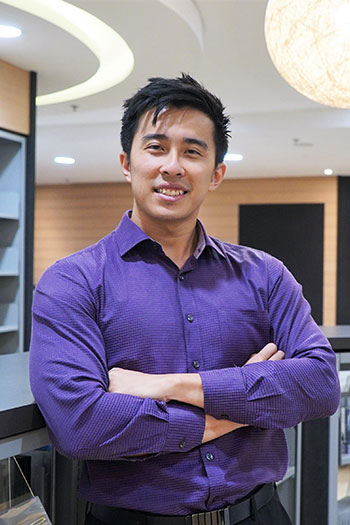
Low Bowen
DSTA Scholarship
Senior Engineer (Digital Hub)
Defence Science and Technology Agency
The scholarship also gave me invaluable hands-on experience as an intern at DSTA’s Enterprise IT Programme Centre. There, I had the opportunity to code prototype apps to test the effectiveness of a hybrid app development framework, which is used to create apps for use across different operating systems. I improved my technological knowledge, and learnt from mentors who were friendly, helpful and open to sharing knowledge.
How have you contributed to the defence of the nation?
As a Senior Engineer in DSTA’s Digital Hub, I explore the applications of emerging technology such as AI, digital analytics and the Internet of Things. The Digital Hub was set up in 2017 to spearhead digital transformation together with MINDEF and the SAF. We are encouraged to tap the latest technologies, as well as to create and test prototypes to evaluate their feasibility for defence applications.
Words of wisdom for the next generation of DSTA scholars?
A career as a defence engineer opens up diverse career paths and roles – you will find exciting opportunities in technological innovation and the management of complex, large-scale projects.
For those considering a career in engineering, computer science or simply want to work with cutting-edge technology, the DSTA Scholarship enables you to apply your knowledge and to see the impact that can be brought about by engineering.
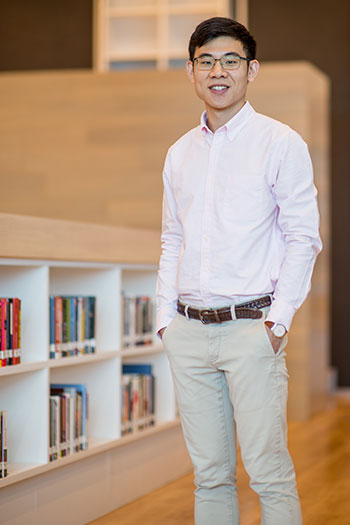
John Lee Wen-Hao
DSTA Scholarship
Radar Engineer (Sensors Division)
DSO National Laboratories
What motivated you to take up the DSTA Scholarship?
I participated in the Young Defence Scientists Programme (YDSP). This gave me the opportunity to attend modules on advanced science topics and take up research projects mentored by researchers from DSO National Laboratories . This exposure inspired me to apply for the DSTA scholarship so I may pursue my interest in R&D and contribute to the defence and security of our nation by being part of the Defence Technology Community (DTC).
What opportunities did the scholarship provide you with?
As a DSTA scholar, I had the opportunity to study Electrical Engineering in the United States – at Carnegie Mellon University and Stanford University. Also, through the Global Internship Programme (GIP), I was attached to Airbus DS in Madrid. It was eye-opening to work in a foreign country and alongside top engineers from multinational companies. I was also blessed to be attached to a plane manufacturer as this enabled me to learn more about avionics and the considerations an engineer should have when building safety critical systems.
How have you contributed to the defence of the nation?
Nowadays, there is a large amount of sensor data, which means high pressure on analysts as they need to translate the huge amount of data into informed decisions. My role is to develop algorithms that will help make sense of this data, processing it into meaningful information that decision-makers can use to secure our national interests.
Words of wisdom for the next generation of DSTA scholars?
It is an exciting time as what is considered “state-of-the-art” is constantly changing. There are always new developments and new possibilities, and we must constantly innovate to push the boundaries of what is possible.
I would recommend potential scholars to do some internships to understand what the organisation’s values are, and to see if these values resonate with them. These internships will also help them understand their strengths, and how they can deploy these strengths to advance the mission of the organisation. All in all, the exposure is crucial to helping one decide if he or she will enjoy working in this environment and benefit from the scholarship.
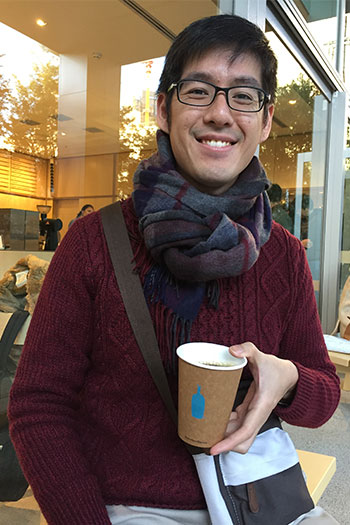
Jerry Thia Yew Jia
DSTA Scholarship
Manager
Comms - Technology Centre for Strategic
Infocomm Technologies
What motivated you to take up the DSTA Scholarship?
The DSTA Scholarship attracted me because of the opportunities to work in the Defence Technology Community (DTC). I was interested in the diverse career options and how it would enable me to combine my interest in technology with service to the nation.
What opportunities did the scholarship provide you with?
Without the scholarship, I would never have had the opportunity to study overseas, much less at a prestigious university like Cambridge. I got to meet people from different countries and cultures which enabled me to expand my horizons and improve my communication skills, all of which I feel is important to my personal development.
The scholarship also prepared me for my future career by giving me a chance to do my internship with the Centre for Strategic Infocomm Technologies (CSIT). It was through this internship that I became acquainted with the technical work that I would later undertake. It also enabled me to meet my future colleagues and gave me a glimpse of what the working culture at CSIT is like. This experience helped me smoothen the transition from a student to a working adult.
How have you contributed to the defence of the nation?
CSIT is at the forefront of infocomm technologies needed to advance Singapore’s security, and we have teams that delve deeply in cyber security, data analytics and machine learning. Our teams are broadly organized into five job families and I am from Comms-Technology. In Comms-Technology, we analyse networking and communication systems to assess their security. We also develop large-scale high performance systems integral to cyber defence.
I personally contribute by leading a team of software developers working on large-scale system development and working closely with my team’s Senior Technical Specialist to anticipate and overcome challenges. The conventional approach to monitoring system health has become increasingly tedious as the number of deployed machines increases. To tackle this, we learnt from our Analytics team to use data analytics to track the various system health indicators and anticipate hardware issues. Through this learning journey of exploring ways to improve our work, we have grown from system developers running programs via the command line, to applying analytics and having Web UIs to facilitate system monitoring. This was made possible by the collaborative and learning culture here at CSIT. Through cross-cluster collaboration opportunities, I also seek to assist other teams in the organisation with the challenges that they face.
Words of wisdom for the next generation of DSTA scholars?
You should choose your scholarship based on the career that interests you the most. Also, even as a scholar, remember that learning is more than just pursing good grades. It is also important to build relationships and accumulate experiences outside of the classroom setting as these things will have an equally important impact on your working life.
